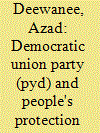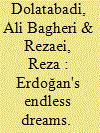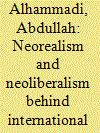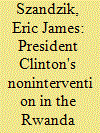|
|
|
Sort Order |
|
|
|
Items / Page
|
|
|
|
|
|
|
| Srl | Item |
| 1 |
ID:
183729


|
|
|
|
|
| Summary/Abstract |
This extended article argues a case for an Israeli-Palestinian-Jordanian Confederation, proposes the central elements necessary to realize this in practice, and offers policy advice to the key players as well as to policy makers in the United States, Germany, Saudi Arabia, and Egypt. After 73 years of conflict, following the Arab Spring, and the intermittent violence between Israel and the Palestinians, the Palestinians will not give up on their aspiration for statehood. Ultimately, a two-state solution remains the only viable option to end their conflict. The difference, however, between the framework for peace discussed in the 1990s and 2000s—where the focus was on establishing a Palestinian state in the West Bank and Gaza—versus the present time is that many new, irreversible facts have been created: the interspersing of the Israeli and Palestinian populations in the West Bank, Jerusalem, and Israel; the status of Jerusalem, where both sides have a unique religious affinity; Israeli settlements in the West Bank, the majority of which will have to remain in place; the intertwined national security concerns involved; and the resettlement of/compensation for Palestinian refugees. I argue that independent Israeli and Palestinian states, therefore, can peacefully coexist and be sustained only through the establishment of an Israeli-Palestinian confederation that would subsequently be joined by Jordan, which has an intrinsic national interest in the resolution of all conflicting issues between Israel and the Palestinians. To that end, all sides will have to fully and permanently collaborate on many levels necessitated by the changing conditions on the ground, most of which can no longer be restored to the status quo ante.
|
|
|
|
|
|
|
|
|
|
|
|
|
|
|
|
| 2 |
ID:
183730


|
|
|
|
|
| Summary/Abstract |
This article explores the construction of the Syrian Kurdish Democratic Union Party (PYD) and the People's Protection Units (YPG) in Turkish official discourse. In the article, I employ critical discourse analysis (CDA) to analyze written texts produced during the years 2014–2019 that reflect the position of the Turkish authorities. The article sets out the main narratives that construct the PYD and YPG as terrorist organizations and posits them as a threat to both Turkey and the international community. The analysis reveals that these narratives serve the purpose of delegitimizing the PYD and YPG and legitimizing Turkish military operations and violations against Syrian Kurds. It highlights that the Turkish official position regarding the PYD and YPG is driven by two ideological factors: first, the influence of Kurdish autonomy in Syria on the action of Kurds in Turkey, and second, the barrier that the PYD and YPG have created against the Islamist agenda of Turkey's Justice and Development Party (AKP) in Syria.
|
|
|
|
|
|
|
|
|
|
|
|
|
|
|
|
| 3 |
ID:
183732


|
|
|
|
|
| Summary/Abstract |
After the Justice and Development Party (AKP) rose to power in 2002, Turkey's Middle East policy underwent a radical change. Erdoğan's readings of the Arab Spring events are a vivid example of Turkey's new foreign policy. In the last months of 2019 and 2020, Turkey took two other important steps that have attracted the attention of the international community: engagement in Operation Peace Spring in northern Syria without UN Security Council authorization, and steps to reach an agreement with the Libyan government on oil and gas exploration in the Mediterranean in tandem with sending troops to Libya. Turkey's recent actions, which violate international law and UN resolutions, raise several questions: what changes have taken place in Turkey's foreign policy? What are its core drivers and main components? And what results will the new policy deliver in the future? We argue that Turkey's behavior conforms to the principles of offensive realism. The shift in Turkey's foreign policy and the trend toward offensive realism are rooted in the 2011 Arab Spring and subsequent events in the Middle East. The failed coup of 2016 accelerated these changes and pushed them in new directions. Turkey is now seriously aiming to maximize its power, particularly in the politico-military field, which could increase tensions in the sensitive region. We submit that Turkey cannot be guided by offensive realism in the long term, however.
|
|
|
|
|
|
|
|
|
|
|
|
|
|
|
|
| 4 |
ID:
183733


|
|
|
|
|
| Summary/Abstract |
The literature contains much discussion on the contemporary differences between neorealism and neoliberalism, especially in the context of international relations. However there have, as yet, been limited attempts to investigate how these international relations theories fare in explaining state responses to the COVID-19 outbreak. This study reviews the conceptual frameworks underpinning neorealism and neoliberalism and applies them to key state behaviors during the COVID-19 outbreak. Some examples of neorealism attached to the current pandemic include: criticism of the role of the World Health Organization, the closure of international borders, international competition to collect pharmaceutical products, bans on exports, richer states protecting their national interests, the international misuse of power during emergency orders, restrictions placed on the international media, and the deployment of military forces. By contrast, neoliberalism's focus on international cooperation is noted in U.S., Chinese, and other countries’ attempts to distribute knowledge and aid internationally, as well as in the efforts of key international organizations like the World Health Organization and the global Covax initiative. I offer an evidence-based conceptual framework using neorealism and neoliberalism to show how both have informed international behavior during the COVID-19 outbreak—although continued emphasis on the former shows few signs of abating as the pandemic approaches its third year.
|
|
|
|
|
|
|
|
|
|
|
|
|
|
|
|
| 5 |
ID:
183731


|
|
|
|
|
| Summary/Abstract |
This article analyzes the Kurdish question in the Middle East from the English School perspective in international relations. The central argument is that the international community consistently deals with the Kurdish question through the principle of order rather than justice. It has respected the sovereignty of those nation-states hosting the Kurds rather than protecting the Kurdish population from grave human rights violations. Consequently, the Kurds have failed to achieve a semblance of autonomy, let alone independence. However, I argue that while the implementation of the no-fly-zone over northern Iraq in 1991 by the international community is a case for justice, it is not necessarily a case against the principle of order. In other words, the international community only dealt with the Kurdish issue using the principle of justice when implementing the 1991 no-fly-zone—but, notably, this was not against the principle of order.
|
|
|
|
|
|
|
|
|
|
|
|
|
|
|
|
| 6 |
ID:
183734


|
|
|
|
|
| Summary/Abstract |
This research analyzes Clinton's decision to not intervene in the Rwandan genocide. The methodology used is a historical analysis and interpretation of primary and secondary source material. Clinton admitted that not intervening in the Rwandan genocide was one of the greatest regrets of his presidency. There was not a substantial amount of domestic support for an intervention into Rwanda and Clinton did not attempt to use his influence to change that disposition. Clinton did not attempt to change domestic sentiments due to his priorities of reduced funding for foreign operations and the avoidance of ‘mission creep.’ The most common fault in the current historiography is the claim that Clinton did not intervene in Rwanda because of the failed mission that had recently occurred in Somalia, which does not align with the available evidence. Upon leaving office, he accepted ownership of his poor decisions and expressed sincere regret.
|
|
|
|
|
|
|
|
|
|
|
|
|
|
|
|
| 7 |
ID:
183735


|
|
|
|
|
| Summary/Abstract |
This essay reviews ecological economist, Giorgos Kallis’ recent book, ‘Why Malthus Was Wrong and Why Environmentalists Should Care’ (2019) to review the debate around population and sustainability. In the name of sustainability and resource scarcity, debates on population tend to blame the poor without adequately problematizing structural inequalities that sustain racial capitalism and stimulate scarcity. This narrative is a remnant of the Malthusian thesis that problematized population growth in relation to food scarcity without problematizing utilitarian human wants. In this essay, I review this book because the author expands on the politics of scarcity and urges us to nurture ethics and the politics of limits. My contribution in this extended review comes in offering a perspective from post-colonial countries like India, and in the global South more broadly, that align with ‘other’ notions of limits, the good life, and sustainability.
|
|
|
|
|
|
|
|
|
|
|
|
|
|
|
|
|
|
|
|
|